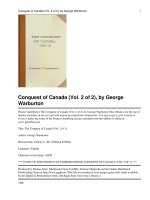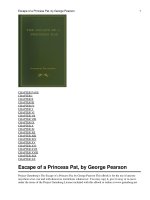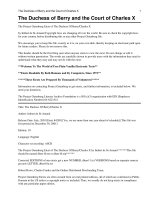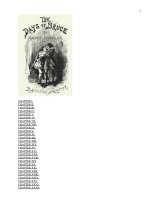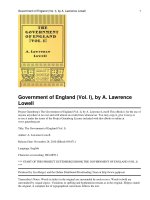The History of Cuba, vol. 4 potx
Bạn đang xem bản rút gọn của tài liệu. Xem và tải ngay bản đầy đủ của tài liệu tại đây (751.7 KB, 224 trang )
History of Cuba, vol. 4, by Willis Fletcher Johnson
Project Gutenberg's The History of Cuba, vol. 4, by Willis Fletcher Johnson This eBook is for the use of
anyone anywhere at no cost and with almost no restrictions whatsoever. You may copy it, give it away or
re-use it under the terms of the Project Gutenberg License included with this eBook or online at
www.gutenberg.org
Title: The History of Cuba, vol. 4
Author: Willis Fletcher Johnson
Release Date: October 8, 2010 [EBook #33848]
Language: English
Character set encoding: ISO-8859-1
*** START OF THIS PROJECT GUTENBERG EBOOK THE HISTORY OF CUBA, VOL. 4 ***
Produced by Chuck Greif and the Online Distributed Proofreading Team at
[Etext transcriber's note:
The use of Spanish accents in this text varies and has not been altered (ie. both Senor and Señor [tilde n],
Senora and Señora [tilde n], José [acute accented letter e] and Jose appear; both Nunez and Nuñez [tilde n],
Marti and Martí [acute accented i], Carreno and Carreño appear [tilde n].)
History of Cuba, vol. 4, by Willis Fletcher Johnson 1
Several typographical errors have been corrected (Almandares=>Almendares, Donate=>Donato, etc.).]
[Illustration: JOSÉ MARTÍ
The first great apostle and martyr of the Cuban War of Independence, José Martí, was born in Havana on
January 28, 1853, and fell in battle at Dos Rios on May 19, 1895. He was a Professor of Literature, Doctor of
Laws, economist, philosopher, essayist, journalist, poet, historian, statesman, tribune of the people, organizer
of the final and triumphant cause of Cuban freedom. He suffered imprisonment in Spain and exile in Mexico,
Guatemala, and the United States, doing his crowning work in the last-named country as the vitalizing and
energizing head of the Cuban Junta in New York. His fame must be lasting as the nation which he founded,
wide as the world which he adorned.]
THE
HISTORY OF CUBA
BY
WILLIS FLETCHER JOHNSON
A.M., L.H.D.
Author of "A Century of Expansion," "Four Centuries of the Panama Canal," "America's Foreign Relations"
Honorary Professor of the History of American Foreign Relations in New York University
WITH ILLUSTRATIONS
VOLUME FOUR
[Illustration]
NEW YORK
B. F. BUCK & COMPANY, INC.
156 FIFTH AVENUE
1920
Copyright, 1920,
BY CENTURY HISTORY CO.
All rights reserved
ENTERED AT STATIONERS HALL
LONDON, ENGLAND.
PRINTED IN U. S. A.
History of Cuba, vol. 4, by Willis Fletcher Johnson 2
CONTENTS
PAGE
History of Cuba, vol. 4, by Willis Fletcher Johnson 3
CHAPTER I
1
Cuba for the Cubans Era of the War of Independence Organization of the Cuban Revolutionary
Party Vigilance of the Spanish Government The Sartorius Uprising The Abarzuza "Home Rule"
Measure Beginning of the War of Independence José Marti, His Genius and His Work Members of the
Junta in New York Independence the Aim Marti's Departure for Cuba Association with Maximo
Gomez Death of Marti His Legacy of Ideals to Cuba.
CHAPTER I 4
CHAPTER II
19
Aims and Methods of the Junta Efforts to Avoid American Complications Filibustering
Expeditions Contraband Messenger Service Attitude of the Various Classes of the Cuban People Toward
the Revolution No Racial nor Partisan Differences The Spanish Element The Mass of the Cuban People
United for National Independence.
CHAPTER II 5
CHAPTER III
29
The First Uprising Failure in Havana Success in Oriente Response of the Spanish Authorities Superior
Numbers of the Spanish Forces Early Complications with the United States-Seeking Terms with the
Patriots Grim Reception of an Envoy Ministerial Crisis at Madrid over Cuban Affairs Martinez Campos,
"Spain's Greatest Soldier," Sent to Cuba His Conciliatory Policy His Military Preparations Antonio
Maceo Uprisings in Many Places Provisional Government of the Patriots Campos's Barricades Campos
Beaten by Maceo.
CHAPTER III 6
CHAPTER IV
47
Declaration of Cuban Independence First Constitutional Convention The First Government of
Ministers Founders of the Cuban Government Desperate Efforts of Campos Disadvantages of the
Cubans Plantation Work Forbidden Campaigns by Maceo and Gomez Losses of the Spaniards at
Sea Reenforcements from Spain Welcomed Cuban Headquarters at Las Tunas Invasion of
Matanzas Defeat and Narrow Escape of Campos Action of the Autonomists Loyalty Pledged to
Campos State of Siege in Havana Campos Recalled to Spain.
CHAPTER IV 7
CHAPTER V
65
General Marin General Weyler the New Captain-General His Arrival and Remorseless Policy Cuban
Elections a Farce The Trocha A War of Ruthless Destruction Many Filibustering Expeditions Interest of
the United States Government Diplomatic Controversies Efficiency of the Provisional
Government Strengthening the Trocha Activity of Maceo His Betrayal and Death Campaigns of Gomez
and Others Calixto Garcia The Great Advance Westward President Cleveland's Significant Message to the
United States Congress.
CHAPTER V 8
CHAPTER VI
82
Bad Effects of Maceo's Death Weyler in the Field Against Gomez Daring and Death of
Bandera Dissensions in the Camp of Gomez Weyler's Concentration Policy A Practical Attempt at
Extermination Senator Proctor's Observations President McKinley's Message Crisis in Spain Weyler
Recalled and Succeeded by Ramon Blanco Further Attempts at Reform and Conciliation Condition of
Cuba The Revolutionists Uncompromising The Ruiz-Aranguren Tragedy Organization of the Autonomist
Government Attitude of the Spaniards Visit of the Maine to Havana Destruction of the Vessel The
Investigations Futile Efforts of the Autonomist Government
CHAPTER VI 9
CHAPTER VII
103
The Destruction of the Maine not the Cause of American Intervention Causes Which Led to the
War Diplomatic Negotiations German Intrigue President McKinley's War Message His Attitude Toward
the Cuban People Spanish Resentment Declaration of War American Agents Sent to Cuba Attitude of
Maximo Gomez Supplies, not Troops, Wanted Blockade of the Cuban Coast Spanish Fleet at
Santiago Landing of the American Army Operations at Santiago Services of the "Rough Riders" Naval
Battle of Santiago Surrender of the Spanish Army The Armistice.
CHAPTER VII 10
CHAPTER VIII
118
Departure of the Spanish Forces from Cuba Treaty of Peace Between the United States and Spain Cuba to
be Made Independent The Cuban Debt First American Government of Intervention The Roll of Spanish
Rulers from Velasquez in 1512 to Castellanos in 1899 Relations between Americans and
Cubans Disbandment of the Provisional Government and Demobilization of the Cuban Army A Mutinous
Demonstration Paying Off the Cuban Soldiers.
CHAPTER VIII 11
CHAPTER IX
139
American Occupation of Cuba General Wood's Administration at Santiago His Antecedents and Preparation
for His Great Work A Formidable Undertaking Conquering Pestilence Organization of the Rural
Guards American Administration at Havana and Throughout the Island Grave Problems Confronting
General Brooke Agricultural and Industrial Rehabilitation Reorganizing Local Government Triumphal
Progress of Maximo Gomez Unification of Sentiment Among the People Finances of the Island Church
and State Marriage Reform Franchises Refused The Census Improving the School System.
CHAPTER IX 12
CHAPTER X
158
General Brooke Succeeded by General Leonard Wood Favorable Reception of the Soldier-Statesman A
Cabinet of Cubans Efficient Attention Paid to Public Education Cuban Teachers at Harvard Caring for
Derelict Children Public Works Sanitation Port Improvements Roads Paving The Heroic Drama of the
Conquest of Yellow Fever Work of General Gorgas A Home of Pestilence Transformed into a
Sanitarium Reforms in Court Procedure Cleaning Up the Prisons The First Election in Free Cuba Rise of
Political Parties Taxation and the Tariff Increase of Commerce.
CHAPTER X 13
CHAPTER XI
185
Preparations for Self-Government Call for a Constitutional Convention The Election Meeting of the
Convention General Wood's Address Organization of the Convention Framing the Constitution Debates
over Church and State, and Presidential Qualifications Signing of the Constitution No Americans Present at
the Convention General Provisions of the Constitution Relations between Cuba and the United
States Controversy between the Two Governments Origin of the "Platt Amendment" Attitude of the
Cubans Toward It Malign Agitation and Misrepresentation A Mission to Washington Final Adoption of the
Amendment.
CHAPTER XI 14
CHAPTER XII
204
Text of the Constitution of the Cuban Republic The Nation, Its Form of Government, and the National
Territory Cubans and Foreigners Bill of Rights Sovereignty and Public Powers The Legislature The
President The Vice-President The Secretaries of State The Judicial Power Provincial and Municipal
Governments Amendments.
CHAPTER XII 15
CHAPTER XIII
240
Election of the First Cuban Government Candidates for the Presidency Tomas Estrada Palma Chosen by
Common Consent General Maso's Candidacy The Election Close of the American Occupation A Festal
Week in Havana Transfer of Authority to the Cuban Government The Cuban Flag at Last Raised in
Sovereignty of the Island President Roosevelt's Estimate of General Wood's Work in Cuba President
Palma's Cabinet His First Message The United States Naval Station Reciprocity Secured after
Discreditable Delay at Washington.
CHAPTER XIII 16
CHAPTER XIV
259
Admirable Work of the Palma Administration Rise of Sordid Factionalism José Miguel Gomez, Alfredo
Zayas and Orestes Ferrara Character of the Liberal Party, and of the Conservative Party Conspiracy to
Discredit an Election An Abortive Insurrection Pino Guerra's Intrigues The Rebellion of José Miguel
Gomez President Palma's Unpreparedness and Incredulity His Faith in the People The Crisis Suggestions
of the American Consul-General American Intervention sought Ships and Troops Sent Arrival of Mr.
Taft His Negotiations with the Rebels His Yielding to Their Threats Resignation of Estrada Palma Mr.
Taft's Pardon to the Rebels Charles E. Magoon Made Provisional Governor Estimate of President Palma
and His Administration.
CHAPTER XIV 17
CHAPTER XV
283
Mr. Magoon's Administration Recognition of the Liberals The Offices Filled with Liberal
Placeholders Execution of Many Public Works A New Census Taken New Electoral Law Proportional
Representation New Elections Held Split in the Liberal Party The Presidential Campaign Bargain between
José Miguel Gomez and Alfredo Zayas General Menocal and Dr. Montoro The Victory of the
Liberals Changes in Provincial and Municipal Administrations Revision of Laws Settling Church
Claims End of the Second Intervention.
CHAPTER XV 18
CHAPTER XVI
297
Administration of President José Miguel Gomez His Cabinet Sketch of His Career Sketch of Vice-President
Zayas Army Reorganization New Laws The President's Sensitiveness to Criticism Officials in
Politics Charges of Profligacy and Corruption Clash with the Veterans' Association The United States
Interested Quarrels between Gomez and Zayas Formidable Negro Revolt Suppressed Reluctance to Settle
Claims Outrage Upon an American Diplomat Amnesty Bill The Lottery Established The "Dragado"
Scandal The Railroad Terminal.
CHAPTER XVI 19
CHAPTER XVII
312
The Fourth Presidential Campaign Candidacy and Career of Mario G. Menocal His Brilliant Work in the
War of Independence and in the Sugar Industry Sketch of Enrique José Varona Dr. Rafael Montoro's
Distinguished Career His Diplomatic Services and Literary Achievements President Menocal's Cabinet His
Aims and Plans for His Administration First Message to Congress Factional Obstruction Paying Off Old
Debts Trying to Abolish Gambling The Civil Service Controversy Over the Asbert Amnesty Bill A Small
Insurrection.
CHAPTER XVII 20
CHAPTER XVIII
328
Reelection of President Menocal Features of the Campaign Liberal Conspiracy to Invalidate the Election by
Revolutionary Means Disputed Elections The Double Treason of José Miguel Gomez Outbreak of a
Carefully Planned Insurrection Intrigues of Orestes Ferrara in the United States Vigorous Military Action of
President Menocal American Assistance Wisely Declined Capture of the Rebel Chieftain Efforts of the
Insurgents at Devastation Continuance of the Rebellion by Carlos Mendieta Dr. Ferrara Warned by the
American Government Attempts to Assassinate President Menocal Clemency Shown to Criminals Attitude
of the United States Government Some Plain Talk from Washington.
CHAPTER XVIII 21
CHAPTER XIX
346
Cuba's Entry into the War of the Nations President Menocal's War Message Prompt Response of
Congress Sentiments of the Cuban People German Propaganda Attitude of the Church Liberal Intrigues
with Germans Seizure of German Ships Conservation and Increased Production of Food Military
Services Generous Subscriptions to Liberty Loans Mrs. Menocal's Leadership in Red Cross Work Noble
Activities of the Women of Cuba Moral and Spiritual Effect of Cuba's Participation in the War.
CHAPTER XIX 22
CHAPTER XX
355
Marti's Epigram on the Revolution How It has been Fulfilled by the Cuban Republic The Sense of
Responsibility Progress in Popular Education as a Criterion Great Gain in Health Enormous Growth of the
Sugar Industry Commerce of the Island Stable Finances Sanitary Efficiency Military
Reorganization Statesmanship of President Menocal Cuba's Unique Situation Among the Countries of the
Globe Significance of the Record Which She has Made from Velasquez to Menocal.
ILLUSTRATIONS
FULL PAGE PLATES
José Marti Frontispiece
FACING PAGE
The Prado 16
Maximo Gomez 44
José Antonio Maceo 74
Bay and Harbor of Havana 98
Old and New in Havana 134
Leonard Wood 158
University of Havana 164
Carlos J. Finlay 172
The Capitol 204
Tomas Estrada Palma 248
The President's Home 268
The Academy of Arts and Crafts 288
Mario G. Menocal 312
Enrique José Varona 316
Rafael Montoro 320
Senora Menocal 352
Boneato Road, Oriente 358
CHAPTER XX 23
TEXT EMBELLISHMENTS
Ricardo del Monte 2
Julian del Casal 6
José Ramon Villalon 13
George Reno 21
La Punta Fortress, Havana 33
Aniceto G. Menocal 50
General Weyler 66
William McKinley 87
Antonio Govin 95
Admiral Cervera 110
Admiral Schley 110
Old Fort at El Caney 112
Theodore Roosevelt 113
Monuments on San Juan Hill 114
Admiral Sampson 115
Peace Tree near Santiago 116
Part of Old City Wall of Havana 122
Gonzalez Lanuza 146
Evelio Rodriguez Lendian 162
Antonio Sanchez de Bustamente 165
Almendares River, Havana 167
Old Time Water Mill, Havana Province 169
Street in Vedado, Suburb of Havana 176
Aurelia Castillo de Gonzalez 192
Scene in Villalon Park, Havana 247
CHAPTER XX 24
Flag of Cuba 250
Coat of Arms of Cuba 251
William H. Taft 276
José Miguel Gomez 298
Dr. Alfredo Zayas 300
Birthplace of Mario G. Menocal 313
Dr. Juan Guiteras 321
General D. Emilio Nuñez 328
José Luis Azcarata 341
Francisco Dominguez Roldan 357
José A. del Cueto 359
Dr. Fernandez Mendez-Capote 360
General José Marti 360
Eugenio Sanchez Agramonte 362
Academy of Sciences, Havana 364
THE HISTORY OF CUBA
CHAPTER XX 25

